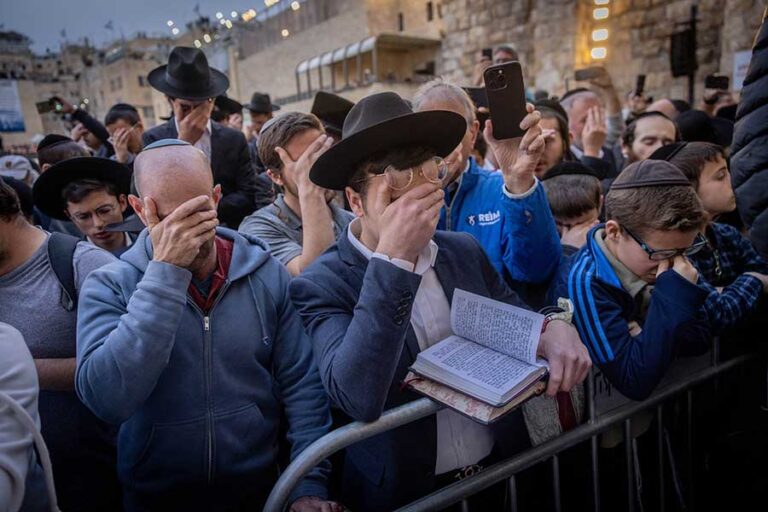In Parshas Shoftim, when the Kohen exhorted the troops before battle, he said Shema Yisrael, and Rashi interprets his message, âAfilu ein bahem zchus ela Krias Shema bilvad, kâdai atem sheâyoshia esâchem â Even if you only have the merit of the saying of Shema Yisrael, you are worthy to be saved.â Thus, it certainly behooves us, during these dangerous times, to brush up on our understanding of the all-important declaration of Shema Yisrael.
For starters, the name Hashem (spelled yud-hei-vav-hei) is explained with two definitions: Adon HaKol, the L-rd of All, and Hu hoyah, hoveh, vâyihiyeh, He Who was, is, and will be. Elokeinu, we translate as âTakif uâbaal hayecholos kulo â the Mighty One who has every conceivable power.â Hashem also refers to the manifestation of midas harachamim, the attribute of mercy, while Elokeinu refers to midas hadin, the attribute of strict justice.
When we say Hashem Elokeinu Hashem Echad, first of all we are declaring that in the present galus, Hashem is just Elokeinu, our G-d only. But with the coming of Moshiach and Hashemâs revelation, then it will be Hashem Echad, Hashem will be the One and Only for everyone. We are also expressing that in our present state we feel the distinction of Hashem and Elokeinu, that there is a manifestation of mercy and also of stern judgment. But, in the future, we will have the clarity of Hashem Echad, that everything is only from the goodness of a merciful G-d.
When we are mâkabel the ohl Malchus Shamayim, when we accept the yoke of Heaven, we proclaim Hashem Echad (spelled alef-ches-daled), that Hashem is the One and Only. As the Kitzur Shulchan Aruch elaborates: the alef, which is numerically one, represents that G-d is the One and Only; the ches, which is numerically eight, represents the seven heavens and one earth; the daled, which is numerically four, represents the four directions. Reb Yisroel Salanter, ztâl, zyâa, famously says that while we are appointing Hashem over the heavens, the earth and the four directions, we shouldnât forget to appoint Him over ourselves as well. When we say Echad, we should have in mind that Hashem is unique and nothing exists independent of Him.
Taking oneâs time to have these thoughts in mind is well worth it. The Gemara informs us, âKol hamarich bâEchad, marichin lo yomov uâshnosov â Whoever prolongs the word Echad will have oneâs life qualitatively and quantitatively prolonged.â The poskim inform us that this doesnât refer literally to saying the word Echad stretched out. This can lead to the improper pronunciation of the word. Rather, it means to start thinking of these ideas while saying Echad, and to take the time to pause afterwards, to finish reflecting upon these concepts before continuing with Baruch Sheimâ¦
Rav Yehuda Leib Chasman, ztâl, zyâa, in the third volume of his monumental Ohr Yahel, asks a powerful question. If Shema Yisrael is meant to be solely our acceptance of the yoke of Heaven, why donât we say, âAni maâamin sheHashem Elokeinu Hashem Echad â I believe that Hashem is our G-d and Hashem is Oneâ? What is the purpose of the prefatory remark, Shema Yisrael? He answers with an extremely fundamental concept. When we preface our commitment with Shema Yisrael, Hear O Yisrael, we accept upon ourselves a specific hanhagas hachaim, a direction of life. That direction of life is to behave in a way that all of Yisrael who view us will realize that Hashem is our G-d. In other words, we accept upon ourselves a refined lifestyle, where anyone who observes us will see that we are not simply living haphazardly, according to our instincts. Rather, we are taking directions from the One G-d Above.
Rav Chasman elaborates further that it fits like a glove with the continuing verse of âVâahavta es Hashem Elokecha â And you should love Hashem, your G-d,â which the Gemara in Yoma [86a] interprets, âSheâyhei Sheim Shamayim misaheiv al yadecha â That the Name of Heaven should be loved through you.â We should live a life of such kindness, sensitivity and integrity that people will come to love the G-d Who instructs us how to behave. This is the affirmation of Shema Yisrael which serves as a protection for us in all situations.
May it be the will of Hashem that we concentrate on these thoughts as we say this declaration multiple times throughout the day, and in that merit may Hashem bless us with long life, good health, and everything wonderful.
Transcribed and edited by Shelley Zeitlin.
Regenerate means to restore, renew or revive something that has been damaged or deteriorated. It can refer to the process of growth or renewal of living tissues in a biological organism, or the restoration of something to its original state or condition.
Source link


